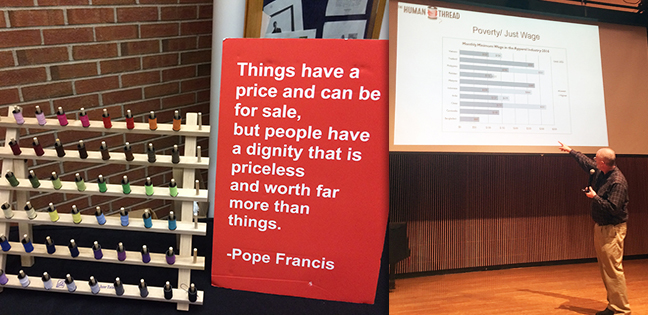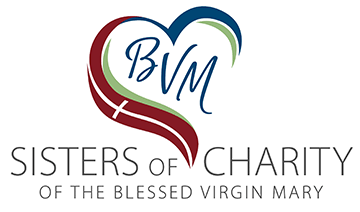‘Am I a Human Trafficker?’

Chris Cox, campaign manager of The Human Thread, explored this question with an audience of 230 in a presentation on Feb. 27 at Clarke University.
Cox was hosted by the Coalition Against Human Trafficking in the Tri-State Area, a faith-based network that began at the request of the Leadership Conference of Women Religious (LCWR), encouraging all religious community members and associates to work together against human trafficking through education and advocacy.
After working in multicultural, low-income parishes in the United States and Latin America, Cox began to manage The Human Thread campaign last year, an outgrowth in part from the Bangladesh clothing factory fire, which killed more than 1,100 people and injured 2,000 more. The workers were paid $50 per month.
Long committed to faith-based advocacy and the work of justice, Cox reflected on where our clothing comes from and how living in right relationship with our brothers and sisters on distant continents helps us to lead more joyful, faith-filled lives.
While most think of human trafficking in terms of sex trafficking, Cox challenged the audience to think about how their technology, food, and clothing purchases from countries with “horrific practices” are also forms of human trafficking.
He notes, “. . . the reality is so many things that are the basis of making our lives comfortable—cell phones, chocolate, coffee, clothing—can grossly be at the expense of other human beings.” He shares that approximately 98 percent of clothes sold in America are made overseas and that only between .5 percent and 3 percent of the cost of production for the average item goes to the worker who made it.
For garment workers to make a living wage, Cox says that the increase in cost per item would only have to be between .5 and 5 percent. “This white t-shirt I’m wearing that would cost $10—to pay a living wage, to triple their wages now—means I would pay $10.50 for it and frankly, I’d want to pay that if given the option.”
BVM vice president Lou Anglin says she now intends to change her own shopping habits after Cox’s presentation. “I grew up being a prudent shopper—looking for deals, but now I need to be aware that paying a just wage for people’s labor is the greater good.”
Cox advises others to do their homework before supporting a brand and to vote with their wallets. He also shares that practicing the “Four Rs” can help to make an impact—repairing our clothes, reducing our closets, and reusing and recycling our clothes by donating them to charity.
